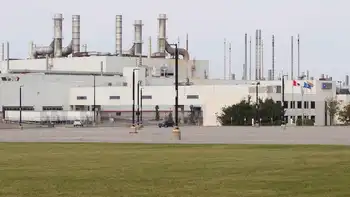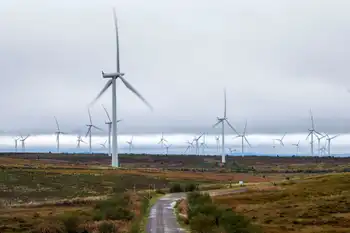U.S. Offshore Wind Power Strategy leverages UK offshore wind lessons, contract auctions, and supply chains to scale renewable energy, build wind farms, cut emissions, create jobs, and modernize the grid to meet 2030 climate goals.
Key Points
U.S. plan to scale offshore wind via UK-style contracts, turbines, and supply chains to meet 2030 clean energy goals
✅ Contract-for-difference price guarantees de-risk projects
✅ Scale turbines and ports to cut LCOE and boost capacity
✅ Build coastal grids, transmission, and workforce by 2030
As President Joe Biden’s administration puts its muscle behind wind power with plans to develop large-scale wind farms along the entire United States coastline, the administration can look at how the windiest nation in Europe is transforming its energy grid for an example of how to proceed.
In the search for renewable sources of energy, the United Kingdom has embraced wind power. In 2020, the country generated as much as 24 percent of its electricity from wind power across the grid — enough to supply 18.5 million homes, according to government statistics.
With usually reliable winds, the U.K. currently has the highest number of offshore turbines installed in the world, with China at a close second.
Experts and industry leaders say it offers valuable lessons on creating a viable market for wind power at the ambitious scale the Biden administration hopes to meet in order to confront climate change and help transition the U.S. economy to renewable energy.
“The U.S. is going to benefit hugely from the early investment that European governments have put into offshore wind,” said Oliver Metcalfe, a wind power analyst at BloombergNEF in London, an independent research group.
Big American plans
On Oct. 13, the White House announced ambitious offshore wind plans to lease federal waters off of the East and West Coasts and Gulf of Mexico to develop commercial wind farms.
The move is part of Biden’s goal to have 30,000 megawatts of offshore wind power produced in the United States by 2030, with projects such as New York's record-setting approval highlighting the momentum. The White House says that would generate enough electricity to power more than 10 million homes and in the process create 77,000 jobs.
But there is a chasm between where the U.S. is now and where it wants to be within the next decade when it comes to offshore wind power.
“We’re the first generation to understand the science and implications of climate change and we’re the last generation to be able to do something about it.”
The U.S. is not new to wind power; onshore wind in states such as Texas, Oklahoma and Iowa supplied 8.2 percent of the country’s total electricity generation in 2020, according to the U.S. Department of Energy.
But despite its long coastlines, offshore wind has been a largely untapped resource in the U.S. With a population of about 332 million people, the U.S. currently has just two operational offshore wind farms — off Rhode Island and Virginia — with the capacity to produce 42 megawatts of electricity between them, far from the 1 gigawatt on-grid milestone many are watching.
In contrast, the U.K., with a population of 67 million people, has 2,297 offshore wind turbines with the capacity to produce 10,415 megawatts of electricity.
Power station or a park?
Just outside of central Glasgow, the host city for the U.N. climate change conference known as COP26, the fruits of years of effort to move away from fossil fuels can be seen and heard
International financiers, including the World Bank are helping developing countries scale wind projects to meet climate goals.
Whitelee Windfarm, the U.K.’s largest onshore wind farm, spreads across 30 square miles on the Eaglesham Moor and includes more than 80 miles of trails for walking, cycling and horseback riding.
With its 539 megawatt capacity, it generates enough electricity for 350,000 homes — more than half the population of Glasgow.
On a recent gusty fall day, Ian and Fiona Gardner, both 71, were walking their dogs among the wind farm’s 360-foot-tall turbines
“This is a major contribution to Scotland, to become independent from oil by 2035,” Ian Gardner, an accountant, said.
Thanks to the rapid technological advances in turbine technology, this wind farm that was completed in 2009, is now practically old school. The latest crop of onshore turbines typically generate double the current capacity of Whitelee’s turbines.
“It took us 20 years to build 2 gigawatts of power. And we’re going to double that in five years,” said McQuade, an economist. “We can do that because machines are big, efficient, cheap and the supply chain is there.”
The biggest operational offshore wind farm in the world right now, Hornsea Project One, is about 75 miles off England’s Yorkshire coast in the North Sea.
Owned and operated by Orsted, a former Danish oil and gas giant, in partnership with Global Infrastructure Partners, its 174 turbines have the capacity to generate 1.2 gigawatts — enough to power over 1 million homes and roughly equivalent to a nuclear power plant.
Benj Sykes, Vice President of U.K. Offshore Wind at Orsted, called Hornsea One a “game changer” in a recent phone interview, citing it as an example of how the industry has scaled up its output to compete with traditional power plants.
But massive projects like Hornsea One took decades to get up and running, as well as government help. According to Malte Jansen, a research associate at the Centre of Environmental Policy at Imperial College London, the British government helped facilitate a “paradigm shift” in renewable energy in 2013.
The electricity market reform policy set up a framework to incentivize investment in offshore wind farms by creating an auction system that guarantees electricity prices to developers in 15-year contracts, alongside new contract awards that add 10 GW to the U.K. grid.
This means there is no upside in terms of market price fluctuation, but there is no downside either. The policy essentially “de-risked the investment,” Jansen said.
The state contracts allowed the industry to innovate and learn how to develop even larger and more efficient turbines with blades that stretch as long as 267 feet, about three-quarters the size of a U.S. football field.
While this approach helped companies and investors, it will also have an unintended beneficiary — the U.S., Metcalfe from BloombergNEF said.
Developers are “taking the lessons they’ve learned building projects in Europe, the cost reductions that they’ve achieved building projects in Europe and are now bringing those to the U.S. market,” he said.
Related News













